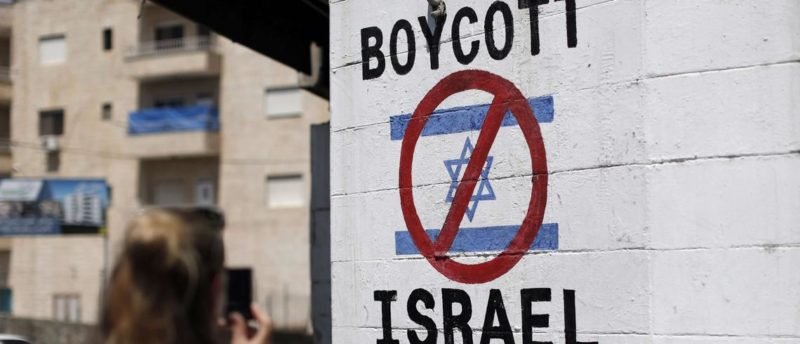Reviewing the BDS Movement in India

Inspired by the South African anti-apartheid movement, Boycott, Disinvest, and Sanctions (BDS) is a Palestinian led movement that aims at mobilizing economic and political pressure on Israel and separating it from other countries internationally. The thirteen-year-old movement was established out of the need to respond to the ‘apartheid and settler colonialist’ Israel and to tackle its ‘atrocities’ against the Palestinians. Israel sees the controversial and non-violent BDS campaign as an ‘existential threat’ to the Jewish state.
The movement has brought negative publicity to corporate giants like Airbnb and HP for lining up closely with Israel and forced popular companies such as Veolia, G4S, Orange, and CRH to withdraw all their projects and investments from the Israeli market. It has also rendered cultural events and provoked academic and sports organizations to take a stand on the immensely estranged conflict. The United Nations and the World Bank have generated reports alluding to the success of the movement and its adverse effects on Israel’s economy. Moreover, many known celebrities such as Roger Waters, Russell Brand, Lauryn Hill, and Zayn Malik have refused to perform in Israel in solidarity with the Palestinian cause.

Considered as Palestinian’s last resort, the BDS movement has affected Israel tremendously by branding Israel as a human-rights violating apartheid state. While few countries have implemented laws opposing the movement, many have showcased strong support for it. For instance, the movement has always been popular amongst left-wing groups in the UK, but with the Conservative party in power, the new government is planning to pass a law restricting local authorities from participating in any BDS Movement. US has also passed a bipartisan resolution condemning the BDS movement as one that “promotes principles of collective guilt, mass punishment and group isolation, which are destructive of prospects for progress towards peace.”
Despite increasing support for Israel by the US and UK, forces of the BDS movement have been successful in attracting a few countries such as Denmark, Ireland, Sweden, and South Africa to its side of the court. The Swedish Foreign Minister, Ann Linde stressed in an interview that her country ‘supports organizations that attack the Israeli occupation.’ Moreover, the Irish government, on the other hand, passed a bill banning any goods manufactured in the ‘occupied territory’ of Israel in Ireland. According to this government, the entire East Jerusalem in West Bank and Gaza falls into the same category of ‘occupied territory’.
Regardless of a right-wing leaning government which extends its support to Israel more openly than before, the campaign managed to make its way into the Indian subcontinent. The BDS supporters engulf only a trivial proportion of the entire country within the broader political spectrum and therefore, their scope of intervention in the state decisions of trade with Israel remains benign. Beyond the arms purchases, the overall trade with Israel is nominal and thus the movement is still in its initial phases, but gaining momentum slowly. As a consequence, to this, the forces of BDS in India, have not yet reached its potential stage.

The movement has been recognized amongst India’s political left and Muslim minorities. A conference was organized in September 2010 in New Delhi, titled “A Just Peace for Palestine” with a motive of calling for boycott, divestment, and sanctions (BDS) against Israel. The conference was co-organized by the anti-Israeli organizations like the Palestinian BDS National Committee (BNC), the Committee for Solidarity with Palestine, the All India Peace and Solidarity Organization, and the recently established Indian Campaign for the Academic and Cultural Boycott of Israel, (INCACBI). The conference ended with a resolution that called upon “the Indian government to end its military ties with Israel and return to its earlier commitment to the cause of the Palestinian people.” The resolution appealed to “people in India to join the Boycott, Divestment and Sanctions (BDS) campaign as a show of solidarity with the Palestine people and their just struggle.”
INCACBI in recent times has taken over the vision of the BDS Movement in India. They have been at the forefront in transforming few Indian companies into ‘HP (Hewlett Packard) Free Zones’ and have received support from India’s largest student-run organization Student’s Federation of India with over 4.3 million members. Vikram Singh, General Secretary of SFI, assured that the movement to boycott HP in India will only grow with time.
As of 2018, India-Israel’s bilateral trade (excluding defence) stood at US$ 5.84 billion and India also emerged as one of the largest importers of Israel’s manufactured arm goods and weapons. Criticizing India’s defence trade with Israel, Omar Barghouti, co-founder of the BDS movement said that Israel’s “regime of oppression can never be a model for the great Indian nation that once led the non-aligned movement and upheld the right of all nations to self-determination”.
The campaign to spurn Israel goes beyond boycotting Israel financially in India. One of its key initiatives calls for boycotting Israel in academic institutions as well. The students of Jamia Milia Islamia have been the torchbearers for this particular initiative. In October 2019, when an invitation to be a keynote speaker was extended to an Israeli academician, the students of Jamia Milia Islamia decided to take this matter into their own hands and took it to the streets. The crisis erupted when the University decided to maintain a pro-Israeli stand and did not prevent the Israeli delegate from attending the seminar meet. Delhi Minorities Commission in support of the agitated students issued a notice to the university stating: “Apparently JMI authorities are unaware about the international BDS movement in which many universities in the East and West are boycotting Israel which is occupying Palestinian lands and is subjecting Palestinians in the occupied territories to worst inhuman treatment.” The University authorities gave in to the demands of the students after a 10-day strike and decided not to include any further collaborations with Israel.
Furthering an anti-Israeli sentiment, the supporters of the movement have also found urging for a cultural boycott of the country. Israel’s Indo Fest Tel Aviv 2019 which was scheduled to be attended by prominent Bollywood celebrities like Anil Kapoor, Ameesha Patel and Raveena Tandon, was cancelled because of the immense pressure from their fans and the international community. The event was aimed at re-branding the country’s image as a modern and democratic state instead of militaristic and religious. Many scholars and researchers also identified Israel’s attempt to attract Bollywood as an attempt to ‘art-wash’ its violations as per the international law and Palestinian human rights.

The BDS Campaign has made several attempts in polarizing India to take a divisive stand but the Modi government has always maintained a ‘de-hyphenated’ policy of recognizing Israel and Palestine as two separate entities. On November 29, 2019, Modi also reiterated a ‘strong support’ for a Palestinian cause and expressed India’s “solidarity with the Palestinian people in their efforts to establish a sovereign, independent, viable and united state of Palestine co-existing peacefully with Israel.” Due to India’s ‘de-hyphenated’ diplomacy and Israel’s immense popularity amongst Indians, the movement has failed in making any major breakthrough. The support for Israel from right-leaning groups remain so high, that it seems the bootless movement will require years to mark any significant success in India.


















